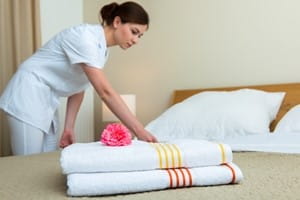
For many people, the onset of warm weather means upcoming trips and weekend excursions with friends and family members. Unfortunately, traveling on planes and trains and staying in hotels also means a higher risk of bringing home the No. 1 unwanted guest: bed bugs.
Whether you're traveling out of the country for an extended period, or just taking a weekend trip to Ontario, it's important to be aware. The beg bug problem in Canada and much of the U.S. doesn't seem to be slowing down anytime soon. In fact, the summer months may just be the worst. From 2014 to 2015 there was a 20 percent spike in the number of reports on bed bugs, according to CTV News Canada.
What's more, according to a recent survey of pest control professionals, conducted by the National Pest Management Association, 75 percent have encountered bed bugs in hotels. That means there's a pretty high chance you may pass through a hotel that was at one time or another the victim of bed bugs. While they are not necessarily considered a health concern, bed bugs are extremely agitating and unpleasant. Getting rid of bed bugs once you have them can be extremely difficult and time-consuming, not to mention expensive. The best way to avoid encounters with these pests is to practice proper prevention methods.
The Centers for Disease Control and Prevention reported that the most effective way to prevent bed bugs is to perform regular inspections for signs of an infestation. The telltale signs of bed bugs include spots of rusty color on bedding, bugs in the fold of mattresses, sweet and musty odors and the exoskeletons of the bugs after they have molted. If bed bugs have invaded unnoticed, symptoms on an individual will include bite marks on the face, arms, hands and neck. However, these can take up to two weeks to appear.
The inspections advised by the CDC should be done by hotel staff on a regular basis. However, it's best to also check the hotel room yourself upon arrival. First and foremost, pull back sheets and bedding to inspect mattress seams and corners for stains or signs of bed bugs. Inspect all furniture, blankets, pillows and headboards. Bed bug infestations are known to spread rapidly and can move from one place to another by attaching to luggage, clothing and even housekeeping carts. The NPMA advised keeping your suitcase in a trash bag to ensure that bed bugs do not find their way inside.
Before packing up your bag at the end of the trip, perform another check to prevent bringing home pesty hitchhikers. Washing all clothing in hot water is also advised. Overall, to be sure that your fun-filled spring travels all go off without a hitch, practicing vigilance and preventative measures are key for avoiding an unwanted run in with bed bugs.